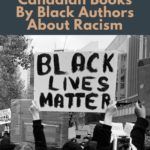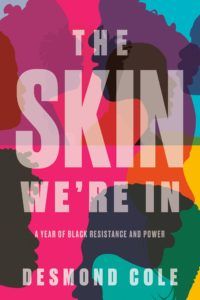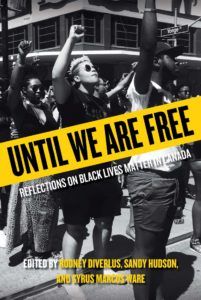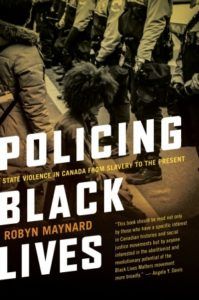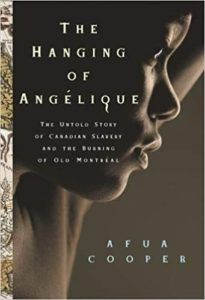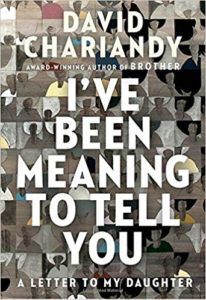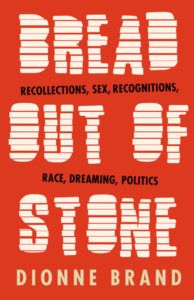As the author of the first book on this list, Desmond Cole, writes: “This idea that Canada’s racial injustices are not as bad as they could be, this notion of Slavery Lite, of Racism Lite, of what my friend calls the ‘toy version of racism’ is a very Canadian way of saying: remember what we could do to you if we wanted to. Passive-aggressive racism is central to Canada’s national mythology and identity.” White Canadians have to accept the reality of racism and specifically anti-Blackness in Canada. They need to educate themselves. This list of nonfiction Canadian books by Black authors about racism, anti-Blackness, and anti-racist activism is one place to start.
The Skin We’re In: A Year of Black Resistance and Power by Desmond Cole
Desmond Cole’s publisher describes the effect of his 2020 book: it “[p]unctur[es] the bubble of Canadian smugness and naive assumptions of a post-racial nation.” Focused on the year 2017 in Cole’s personal and professional life, The Skin We’re In chronicles the Toronto journalist and activist’s own anti-racist work and that by others in Canada. Cole organizes, month by month, a year’s worth of racism and anti-racist activism. The chapters cover topics such as Black immigrants and refugees, Toronto Pride and the police, and the links between Black and Indigenous struggles. It also details Cole’s decision to leave his employer The Toronto Star when they told him his activism for Black lives violated their policies. Readers also learn about his resistance at multiple Toronto police board meetings. The book is an education and a call to action.
Until We Are Free: Reflections on Black Lives Matter in Canada edited by Rodney Diverlus, Sandy Hudson, and Syrus Marcus Ware
Also published this year, the anthology Until We Are Free is edited by the founders of Black Lives Matter Canada, in Toronto. The book takes a broad scope looking at a diverse group of writers’ experiences and thinking on the Black Lives Matter movement in Canada. Topics include using social media in anti-racist organizing, LGBTQ+ Black communities, lack of attention to Black Canadian history, relationships between Indigenous and Black activists, Black futures in Canada, how Black Canadian activism has evolved in Canada, Black disabled lives, and more! Read a wonderful full review of the book on Quill & Quire (a Canadian magazine of book news and reviews) for more information. Overall the pieces show that Canada’s myth of harmonious multiculturalism and reputation of Canadians’ being nice and polite are no match for the reality of systemic racism.
Policing Black Lives: State Violence in Canada from Slavery to the Present by Robyn Maynard
Maynard’s incredibly thorough book about institutional anti-Blackness in Canada came out in 2017. As the back cover asserts, Maynard’s book is the first comprehensive look at “nearly four hundred years of state-sanctioned surveillance, criminalization and punishment of Black lives in Canada.” Topics she addresses include: remnants of slavery in Canadian institutions, past state-sanctioned segregation, incarceration and policing’s affects on Black communities, poverty and unemployment’s disproportionate effect on Black Canadians, exploitation of Black migrant workers, anti-Blackness in Canadian immigration, the removal of Black children from their families by the state, and more. Throughout, Maynard carefully pays attention to intersectional Black communities, including Black women and queer, trans, undocumented, and disabled Black people.
The Hanging of Angelique: The Untold Story of Canadian Slavery and the Burning of Old Montreal by Afua Cooper
Fifteen years of research went into Canadian historian Afua Cooper’s book about this forgotten yet extremely important historical woman. Marie-Joseph Angélique was a 29-year-old enslaved Black woman who had been born in Portugal. In 1734 she was found guilty of starting a fire that destroyed 46 buildings in Montreal. She was tortured after the trial, where tormentors tried to force her to name her accomplices. She confessed to the arson under duress (she had before maintained her innocence) but named no one else. Cooper’s book gives readers a picture of what Angélique’s life was like. It also provides a detailed report of slavery in Canada in the 18th century. The first-person account of Angélique’s life contained in the trial records, in fact, are “arguably the oldest slave narrative in the New World.” Cooper locates Canada in the larger context of transatlantic slavery, disproving the myth that Canada has no history of slavery.
I’ve Been Meaning to Tell You: A Letter to My Daughter by David Chariandy
Inspired by the same James Baldwin essay as Ta-Nehisi Coates was when he wrote Between the World and Me, Chariandy pens a book-length letter about race, identity, and belonging to his 13-year-old daughter. Chariandy’s motivation to write this book came many years before the book. One day when he was out with his then 3-year-old daughter, he quietly ignored a stranger’s racist behavior towards him. His daughter had asked him, simply: “What happened?” In the book he discusses his experiences growing up as mixed race with one Black and one South Asian parent. He also delves into his family’s history of slavery and indenture in Trinidad. Despite the heavy topics, his letter is very tender and sweet, and full of beautiful affirmations like “If there is anything to learn about the story of our ancestry, it is that you should respect and protect yourself; that you should demand not only justice but joy; that you should see, truly see, the vulnerability and the creativity and the enduring beauty of others.”
Bread Out of Stone: Recollections on Sex, Recognitions, Race, Dreaming and Politics by Dionne Brand
Can Lit legend Dionne Brand, who was Toronto’s Poet Laureate from 2009 to 2012, wrote this collection of essays in 1995, but a new edition was released last year. Her writing is both sharp and personal. She discusses topics such as the treatment of young Black people in Toronto, immigration, writing, Black women’s sexuality, the nuances and changes in Black activism in Toronto, capitalism, memory, and more. You could call many of the essays odes to Black Toronto. At the same time as she celebrates the diversity of Black cultures in Toronto, Brand also calls it “this city which treats its white rapists and murderers like the boy next door gone unaccountably and sadly wrong.” Some essays are more focused on description and observation, while others read like political theory Brand is parsing out. Especially interesting is her discussion of how she sees the evolving concepts of equality and justice in the context of anti-racist activism. This list is just a sample of the nonfiction Canadian books by Black authors about racism, anti-Blackness, and anti-racist activism that are available. Want more books by Black authors? Learn about the 5 authors shortlisted for the 2020 Caine Prize for African Writing. How about some romance by Black authors? You can also support Black-owned bookstores in the U.S. Go forth and read!
